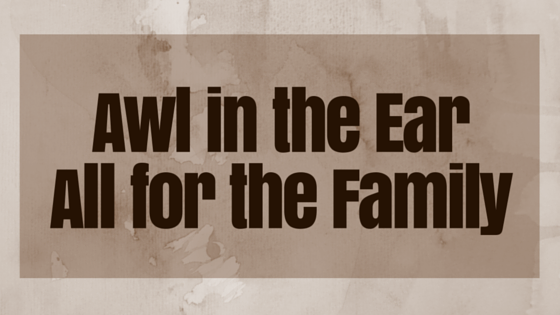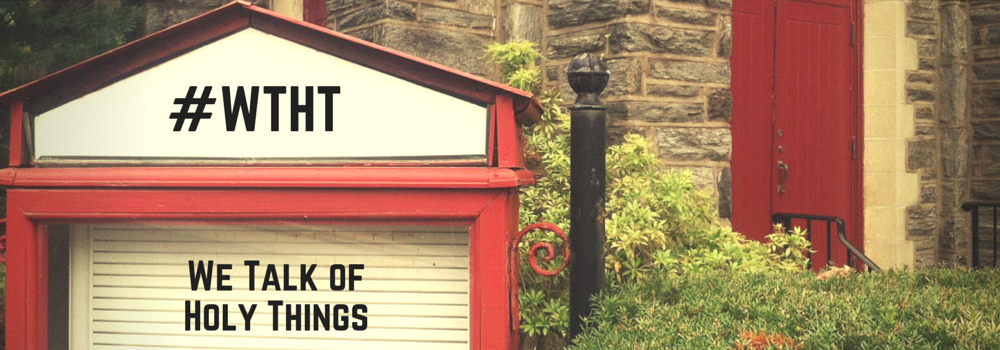 |
| Awl in the Ear, All for the Family. A study on Exodus 21. |
“If you buy a Hebrew slave, he shall serve for six years; but on the seventh he shall go out as a free man without payment.
If he comes alone, he shall go out alone; if he is the husband of a wife, then his wife shall go out with him.
If his master gives him a wife, and she bears him sons or daughters, the wife and her children shall belong to her master, and he shall go out alone.
But if the slave plainly says, ‘I love my master, my wife and my children; I will not go out as a free man,’ then his master shall bring him to God, then he shall bring him to the door or the doorpost. And his master shall pierce his ear with an awl; and he shall serve him permanently."
— Exodus 21:2-6
Lord's Supper Meditation
This passage is fairly commonly referred to during the Lord's Supper, in fact, it was used as a springboard for a devotional on a recent Sunday morning.The brother lead a passionate devotional on the Lord Jesus' devotion to his father as he set his face toward Calvary. This is good. It is a great place to begin. Jesus is the suffering servant of Isaiah 53. He was devoted to the Father and did only the things which pleased him (John 8:29).
According to tradition, the Exodus 21 passage is linked to Psalm 40:6. This Sunday was no exception:
Sacrifice and meal offering You have not desired;
My ears You have opened;
Burnt offering and sin offering You have not required.
Then I said, “Behold, I come;
In the scroll of the book it is written of me.
I delight to do Your will, O my God;
Your Law is within my heart.”
— Psalm 40:6-8
The reference to opening (piercing) ears is clearly a reference to the law of Exodus. The psalmist joins the idea of the devoted slave to a new kind of sacrifice; a sacrifice that does not follow the external tradition of the corporate worship system, but gets at the heart of the matter.
God does not desire little pious displays, what he is after is a Once For All Sacrifice. God wants someone who only does the things which delight him. There is only one man who has ever done that, the Lord Jesus, who was willing to submit to horrible execution on the cross.
A Family Affair
Getting back to the text at hand, notice the motivations involved in the slave's desire to have his ear pierced and therefore forever join himself to his master. The slave must reason within himself:
‘I love my master, my wife and my children; I will not go out as a free man,’
I understand that most of my readers can read. But sometimes details slip by without notice. Here are the terms of the slave's status enumerated:
- Prerequisite: The slave has already served 6 years for his master.
- Condition 1: He is unmarried. He may go free.
- Condition 2: He is married. He and his wife go free. There are no stipulations to his wife's service. It is assumed that the man's service covers the woman's. Suppose she has only served 3 years at the time that her husband is set to go free, she will go with him at that time.
- Condition 3: If the man has children during his 6-year service, both the wife and children belong to the master. If the man goes free, he must go alone. He loses his family.
- Recourse: Go free and live in the corresponding condition (single or married) listed above or bind yourself to the master and keep your family.
I understand this changes the narrative of the original meditation. I do not intend to discredit it in any way. There are great things to be said about it. If you have been reading this blog for a while, you know that I am a strong proponent of multiple meanings in any particular text. Every good piece of literature can be interpreted this way, why not scripture so long as you can support the position? Please bear with me and I hope this interpretation makes sense.
I am implying here that the main motivation for the slave is not love for the master, but love for his family. How often do you suppose a slave said, "I love my master, I'm going to bind myself to him for all eternity and give up any chance for freedom." I'm sure it has happened. Perhaps it was common. It seems more likely, from a sociological perspective, that the slave would say, "If I exercise my freedom, I will lose my family. My only choice is to join myself to this master and keep my wife and children."
There's no ignoring the ethical dilemma created by this situation. Only a scoundrel would abandon his family. Binding himself to the master would seem to benefit the master here. However, for the purpose of this post I do not intend to get into that discussion. I shall table it for a later time. Suffice it to say, the emotional pull of this decision is astronomical.
The Metaphor
I believe there is a clear metaphor to be seen here. One that is beautiful and precious and illustrates what Christ has done for mankind.
The Prerequisite
The number 6 is significant in scripture. It is one short of the perfect number 7 and signifies man, because man was created on that day. Yes, the number 6 is significant because God created the world in 6 days (Genesis 1). Regardless of one's interpretation of days, that is the period of time assigned to God's active work on the creation of the universe.
This is the time period of God's service. He worked. We know this because on the 7th day, when everything was completed, he rested. Everything was done. Note also, all subsequent events were supposed to occur during this day. If sin had not entered the world, and man had not fallen, we would have continued in perfect communion with God during this eternal 7th day of perfect rest.
Concerning the 6-days of creation, who is it that does the work? We know that God upholds the universe by the word of his power (Hebrews 1:3). We also know the word was there in the beginning and was the agency which created all things (John 1). Not only that, but this word became flesh and dwelt among us. By this reasoning, we know attribute creation to Jesus &mdash the Son of God. By him all things consist (Colossians 1:17).
The Condition
During this period of labor, God decides to make man. Not only does he create man, he creates man specially. He creates in his own image. There is a special relationship between man and God as a direct result of this special creation. This relationship is commonly described as a father/son relationship in scripture. It is a familial bond. God created man and placed him into the world as a ruler over it. I believe we can see where this metaphor is going at this point.
Man submits himself to Sin.
After the fall of man, man is now subject to a new master. The master is cruel. The master is harsh. The master punishes his subjects mercilessly. The order of the universe is turned on it's head because of sin. Man is no longer master of his domain, he now dominated by Sin and Death.
The Decision
Now God has a decision to make. He spent the 6 days in service. He can now cut loose and go free, but he cannot take his children with him. He must go alone. That is the law.
While deserting his creation was an option for him, it really was no option at all for a loving God. A good Father would not consider abandonment, so he chose the only other option:
He existed in the form of God, did not regard equality with God a thing to be grasped, but emptied Himself, taking the form of a bond-servant, and being made in the likeness of men. Being found in appearance as a man, He humbled Himself by becoming obedient to the point of death, even death on a cross.
— Philippians 2:6-8
Yes, The Lord Jesus was obedient to his Father who commissioned the work of redemption. Yes, in a sense he bore a hole in his ear and devoted his life to Jehovah.
Jesus also submitted himself to death on the cross. More importantly, he submitted to Death and in doing so, defeated it.
Jesus emptied his essence into the form of a person and suffered under the cruel master of Sin, but never succumbed to partake in Sin's fleeting pleasures. He was tested and tried in every way, but resisted the urge to indulge himself in anything unholy.
As a result, we have a man seated in the heavens mediating between God the Father and ourselves (1 Timothy 2:5). Jesus has bridged the gap because he submitted himself to our masters though he was free. He submitted himself to death on the cross and proves it with holes in his hands and feet and head and side.
Conclusion
I apologize for an extra long post. I try to keep my thoughts concise and clean. Forgive me for rambling a bit.
How vast is the love God has for us? We will continually learn new aspects of his grace and mercy for all eternity. I know there are holes in this metaphorical interpretation of the passage of scripture, but my learning is now in part. I look forward to personally inspecting those wounds and crying out to Jesus; for if I cannot articulate myself in the blogosphere, what chance do I have in person?
























